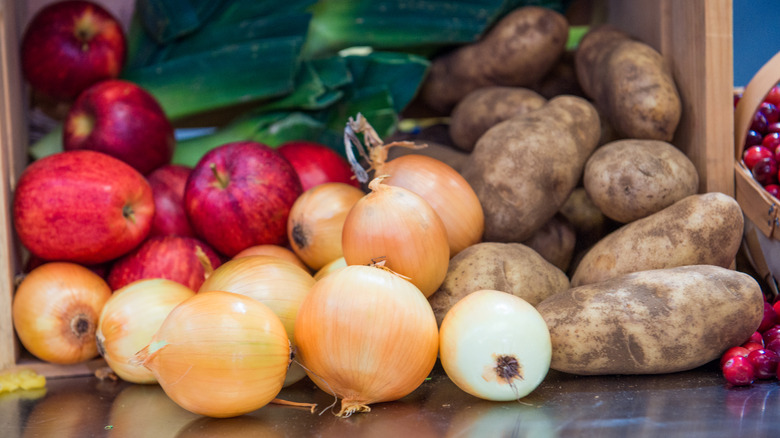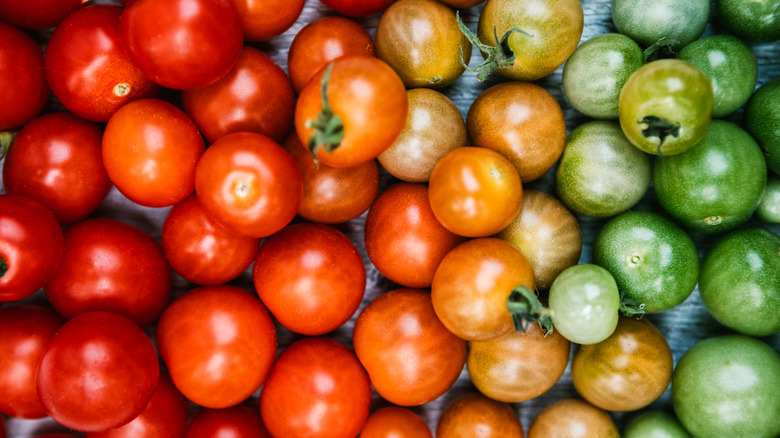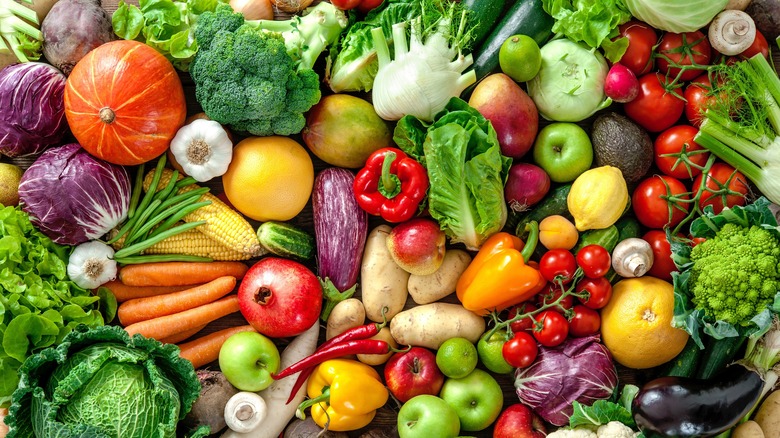Onions, Apples, And Potatoes: What Can I Store Together?
If it feels like your produce is going bad before you get the chance to use it, you may be storing it incorrectly. This goes beyond what you should store on your counter versus the refrigerator. Which types of produce you store with other types of produce makes a difference — and can cause issues.
First things first: Keep smelly produce separate. Christopher Watkins of Cornell University's Integrative Plant Science Horticulture section told the Washington Post that onions will impart odors, and therefore flavors, into produce. Don't keep your onions next to anything you don't want to taste like onion.
Onions need saving from other produce, too — all the more reason to keep them separate. Some fruits and vegetables produce ethylene gas, which encourages other produce to ripen. (More on that shortly.) Thing is, your onions are plenty ripe. Storing your onions and your apples in the fridge drawer together is just going to make your onions rot and your apples taste like onions. That can't sound like a good time to anyone.
What about apples and potatoes? A study published in the "Journal of Food Science and Technology" showed that increased ethylene actually significantly delays and reduces sprouting. Other studies over time have corroborated this, yet conventional wisdom still maintains that onions will cause potatoes to sprout and grow eyes. Ultimately the study showed that, after 16 days, the potatoes will sprout regardless of the apples. Go ahead and store apples with potatoes.
What's ethylene?
To understand how to use ethylene for strategic produce storage, it helps to learn more about how it works. If you've ever heard that you should store bananas with avocados to make them ripen in time for the guacamole you said you'd bring to the party, you're probably already familiar with the concept of using produce to ripen other produce. That's all thanks to ethylene. The gas is a hormone produced and emitted by produce — mostly fruit — in different quantities. It's an autocatalyzer; as it is produced, it induces the production of more ethylene. Take tomatoes, for instance. A green tomato starts to create hormonal ethylene to kickstart ripening. It also emits ethylene into the air as it ripens, which then increases the rate of its ripening.
It's a whole cycle of ripening, and it's not selective. There are two types of produce: Climacteric and non-climacteric. Climacteric produce is affected by ethylene and is able to utilize the gas to keep ripening once it's off the tree, vine, or bush. Non-climactic produce is unaffected by ethylene and can only ripen while still attached to its plant. If you put an ethylene producer next to an ethylene-reactive piece of produce, changes could occur in the ethylene-reactive food. Sometimes that's desirable because it will help produce ripen — starches will turn into sugars, colors will deepen, and delicious aromas will develop. Sometimes, however, that's not desirable, because it could cause the produce to overripen before you're ready to eat it. That's why it's important to store vegetables in the fridge away from climacteric fruits. Knowing what to keep together and what to keep apart reduces food waste.
What you can and can't store together
There are three categories to keep in mind when deciding what to store together: Ethylene-sensitive and climacteric, ethylene-sensitive and non-climacteric; and not ethylene-sensitive.
If you store a climacteric fruit with another ethylene-sensitive and climacteric fruit, it'll make it more ripe. Apples, avocados, mangos, bananas, apricots, peaches, plums, figs, pears, tomatoes, plantains, and peppers are examples of climacteric fruits that are ethylene-sensitive. Storing any one of these next to any other will cause them to ripen.
If you store a climacteric fruit with an ethylene-sensitive and non-climacteric piece of produce, it makes things a lot worse. Storing an apple, for example, with broccoli, Brussels sprouts, cabbage, carrots, cucumbers, leafy greens, celery, asparagus, snap beans, eggplant, leeks, or zucchini will cause adverse effects. Leafy things wilt, carrots become bitter, broccoli yellows, Brussels sprouts sprout and crack. In general, if you don't associate the produce with "leaving it to ripen," don't store it with produce you do associate with "leaving it to ripen."
Then there's the category of produce that is not ethylene-sensitive. This produce will be unaffected by storing it with any of the above. Citrus fruits, cherries, turnips, watermelons, strawberries, winter squash, pineapple, grapes, corn, cauliflower, beets, blueberries, and blackberries are not affected by ethylene. They may still go through changes — pineapples left on the counter will soften and sweeten — but it's unrelated to ethylene. Go ahead and let them sit with your apples (but continue to keep your onions away).


